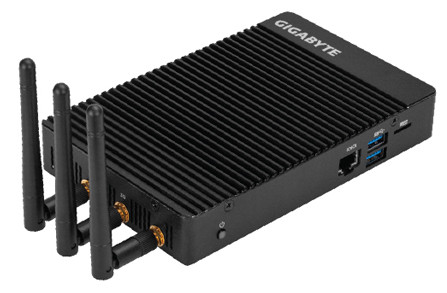GIGABYTE has unveiled BRIX IoT mini PC powered by either Intel Celeron N3450 or Pentium N4200 processor both part of Intel’s Apollo Lake family, and as the name implied the devices target Internet of Things applications.
 GIGABYTE BRIX IoT specifications:
GIGABYTE BRIX IoT specifications:
- SoC (one or the other)
- Intel Celeron N3450 quad core processor @ up to 2.2GHz with Intel HD graphics 500 (6W TDP)
- Intel Pentium N4200 quad core processor @ up to 2.5GHz with Intel HD graphics 505 (6W TDP)
- System Memory – 2x SO-DIMM DDR3L slots @ 1333/1600/1866 MHz up to 8GB
- Storage – 1x M.2 slot, 1x micro SD slot, optional 32 or 64GB eMMC flash
- Connectivity
- Dual Gigabit Ethernet via Realtek RTL8111HS
- Intel Dual band Wireless-AC 3165 module with two SMA antenna connectors
- 3G via mini PCIe slot and SIM card slot with one SMA antenna connector
- Video Output – Dual HDMI 1.4b up to 3840×2160 @ 30 Hz
- Audio – Realtek ALC255 audio codec; microphone/headphone jack, via HDMI ports
- USB – 4x USB 3.0 (2x front, 2x rear)
- Serial – 1x COM port (RS232/422/485) via RJ45 connector (ring indicator not supported)
- Expansion
- 1x M.2 slot (2280_storage) SATA
- 1x M.2 NGFF 2230 A-E key slot occupied by WiFi+BT card
- 1x Half-size mini-PCIe slot for 3G module
- 1x Micro SIM card connector
- Misc – Power button, Kensington lock slot, TPM header
- Power Supply – 19 or 12V DC (shipped with 19V/65W power supply)
- Dimensions – 165 x 105 x 27mm; motherboard: 150 x 100 mm
- Temperature Range – Operating: 0°C to +50°C; storage:: -20°C to +60°C
The fanless IoT gateway ships with a power supply, 75×75 and 100×100 VESA brackets, and is said to support Windows 10 64-bit. The company also expects the mini PC to be used in thin clients, POS solutions, and digital signage.
Price and availability information could not be found, but you may be able to find more details on GIGABYTE GB-EAPD-4200 and GB-EACE-3450 product pages.
Via FanlessTech

Jean-Luc started CNX Software in 2010 as a part-time endeavor, before quitting his job as a software engineering manager, and starting to write daily news, and reviews full time later in 2011.
Support CNX Software! Donate via cryptocurrencies, become a Patron on Patreon, or purchase goods on Amazon or Aliexpress






That’s a pretty interesting thingy, if the price is somewhat reasonable it could easily be a great box for some combination of DIY router, audio server or PLEX client, among a lot of other use cases
The GB-EAPD-4200 is already available in Russia for $330 (I would not say it is a reasonable prpice)
@Ahrlad
There are already a bunch of Chinese designs using the J1900 which would already do everything you mentioned, and are almost guaranteed to cost less.
https://www.aliexpress.com/item/VGA-Mini-PC-with-4-LAN-port-apply-to-Firewall-and-Router-Bay-Trail-j1900-low/32597959732.html
https://www.aliexpress.com/item/4-Gigabit-LAN-J1900-Quad-core-onboard-2-42G-Industrial-mini-Router-Q190G4U/32796443395.html
Don’t get why it has two HDMI outputs, as a IoT hub more USB ports be better.
With its two Gbps NICs it could serve as a very nice DIY Firewall/Proxy and IoT combo. I ordered the UP Squared board for that purpose but BRIX IoT now looks like it would have been a better option, or at least come in a nicer case. Personally I think that putting Firewall/Proxy and IoT gateway/bridge on the same device is a good idea, (maybe not for sexcurity reasons but for convenience as a convergence device).
I think that combining WiFi-Access-Point/Router/Firewall with a IoT gateway/bridge will be the next hot thing in convergence devices for the commercial sector as it will be a smart way to introduce Home Automation hubs into peoples homes with the IoT gateway/bridge is integrated into each WiFi-Access-Point/Router/Firewall that they buy.
Samsung have already announced its “Samsung Connect Home” mesh-networking WiFi routers with built-in Samsung SmartThings IoT gateway/bridge, and it is rumoured that “Google WiFi” routers initially also had integrated Z-Wave, ZigBee, and Bluetooth support to be able to also act as IoT gateways/bridges, and now the latest rumour is that the next-generation Google WiFi routers will have it, probably as a respons to the announcement of “Samsung Connect Home”.
@Harley
It can also be used for point-of-sales: one screen for the seller, one screen for the customer. For digital signage is can also be useful to have two screens. They probably called it “IoT” because it’s a buzz word.
@Harley
Yeah, this cloud connected crap connecting everything and opening up your home could be called ‘SmartBackdoor’ to use another buzz word. 😉
It would be a really attractive device for pfsense but you have to wonder why they chose to put Realtek NICs. Their otehr dual-NIC models such as GB-BSi3HAL-6100 had Intel NICs.
@Occamsrazor
I already sent them an email asking why they are ignoring pfsense community and using cheap realteks…for few bucks these would make greate pfsense routers.
@Catalin
Maybe you should ask them for an in-depth comparison of RTL8111H and eg. I211-AT instead?
I did some ‘RealTek vs Intel and Broadcom’ tests myself and RealTek performed worse in many regards. But that was ~15 years ago. I would love to see recent numbers testing with RTL8211H (requires at least 10.3-RELEASE, 10.2 supported G max IIRC).
> I already sent them an email asking why they are ignoring pfsense community
Because the pfSense community is tiny, and Gigabyte will probably sell more units by slapping “IoT” in the name and selling it to people who haven’t got a clue about Realtek versus Intel network adaptors.
You’re not their target market, so don’t be surprised if you get a giant “meh” in response to your question. They probably chose Realtek because it was cheaper, and they wanted a fatter margin.
Setup video, which also allows to peak inside the mini PC:
https://www.youtube.com/watch?v=AOsMkpeh8Lo